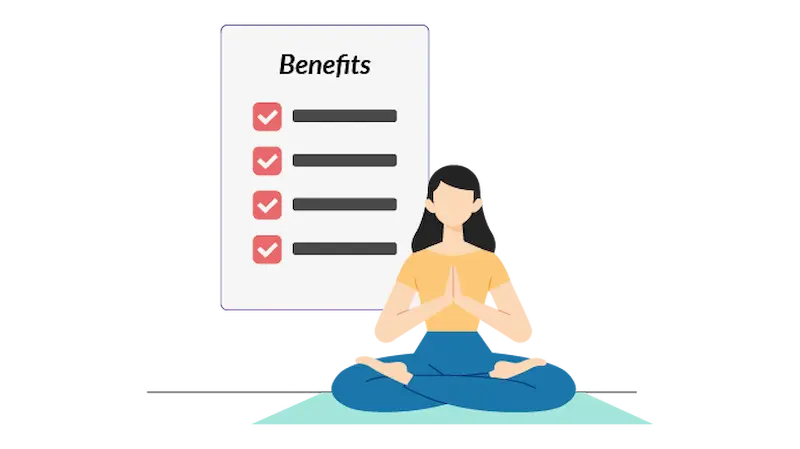Pros and Cons of Meditation with Benefits (Pradeep Nepal)
Published: 22 Sep 2023
If stress makes you anxious, tense, and worried, consider trying meditation. Spending even a few minutes in meditation can help restore your calm and inner peace.
Anyone can practice meditation. It’s simple and inexpensive. And it doesn’t require any special equipment.
And you can practice meditation wherever you are—whether you’re out for a walk, riding the bus, waiting at the doctor’s office, or even in the middle of a difficult business meeting.

Meditation is a lifelong gift. It’s something you can call on at any time.”Paul McCartney
Understanding Meditation
Meditation has been practiced for thousands of years. Meditation was originally was meant to help deepen understanding of the sacred and mystical forces of life. These days, meditation is commonly used for relaxation and stress reduction.
Meditation is considered a type of mind-body complementary medicine. Meditation can produce a deep state of relaxation and a tranquil mind.
During meditation, you focus your attention and eliminate the stream of jumbled thoughts that may be crowding your mind and causing stress. This process may result in enhanced physical and emotional well-being.
Benefits of Meditation
Meditation can give you a sense of calm, peace, and balance that can benefit both your emotional well-being and your overall health. You can also use it to relax and cope with stress by refocusing your attention on something calming. Meditation can help you learn to stay centered and maintain inner peace.
| Significane of mediation in your daily life |
|---|
|
Types of Meditation

| Types of medicine |
|---|
|
Meditation is an umbrella term for the many ways to achieve a relaxed state of being. There are many types of meditation and relaxation techniques that have meditation components. All share the same goal of achieving inner peace.
Ways to meditate can include:
- Guided meditation. Sometimes called guided imagery or visualization, with this method of meditation, you form mental images of places or situations you find relaxing.
You try to use as many senses as possible, such as smells, sights, sounds, and textures. You may be led through this process by a guide or teacher.
- Mantra meditation. In this type of meditation, you silently repeat a calming word, thought, or phrase to prevent distracting thoughts.
- Mindfulness meditation. This type of meditation is based on being aware or having an increased awareness and acceptance of living in the present moment.
In mindfulness meditation, you broaden your conscious awareness. You focus on what you experience during meditation, such as the flow of your breath. You can observe your thoughts and emotions. But let them pass without judgment.
- Qi gong. This practice generally combines meditation, relaxation, physical movement, and breathing exercises to restore and maintain balance. Qi gong (CHEE-gung) is part of traditional Chinese medicine.
- Tai chi. This is a form of gentle Chinese martial arts training. In tai chi (TIE-CHEE), you perform a self-paced series of postures or movements in a slow, graceful manner while practicing deep breathing.
- Transcendental meditation. Transcendental meditation is a simple, natural technique. In this form of meditation, you silently repeat a personally assigned mantra, such as a word, sound, or phrase, in a specific way.
This form of meditation may allow your body to settle into a state of profound rest and relaxation and your mind to achieve a state of inner peace without needing to use concentration or effort.
- Yoga. You perform a series of postures and controlled breathing exercises to promote a more flexible body and a calm mind. As you move through poses that require balance and concentration, you’re encouraged to focus less on your busy day and more on the moment.
Everyday Ways To Practice Meditation
Don’t let the thought of meditating the “right” way add to your stress. If you choose to, you can attend special meditation centers or group classes led by trained instructors. But you can also practice meditation easily on your own. Or you may find apps to use, too.
Here are some ways you can practice meditation on your own, whenever you choose:
- Breathe deeply. This technique is good for beginners because breathing is a natural function.
- Focus all your attention on your breathing. Concentrate on feeling and listening as you inhale and exhale through your nostrils. Breathe deeply and slowly. When your attention wanders, gently return your focus to your breathing.
- Scan your body. When using this technique, focus attention on different parts of your body. Become aware of your body’s various sensations, whether that’s pain, tension, warmth, or relaxation.
Combine body scanning with breathing exercises and imagine breathing heat or relaxation into and out of different parts of your body.
- Repeat a mantra. You can create your own mantra, whether it’s religious or secular. Examples of religious mantras include the Jesus Prayer in the Christian tradition, the holy name of God in Judaism, or the om mantra of Hinduism, Buddhism, and other Eastern religions.
- Walk and meditate. Combining a walk with meditation is an efficient and healthy way to relax. You can use this technique anywhere you’re walking, such as in a tranquil forest, on a city sidewalk or at the mall.
Advantages Of Meditation
- Reduces stress and anxiety: Regular meditation practice has been shown to reduce symptoms of stress and anxiety by decreasing the activity of the stress hormone cortisol and increasing activity in the parts of the brain responsible for regulating emotions.
- Improves focus and concentration: Meditation may help improve focus and concentration by training the mind to stay present and not be easily distracted. This can be especially beneficial for those who struggle with attention disorders such as ADHD.
- Promotes emotional well-being: Meditation can have a positive effect on overall emotional well-being by increasing feelings of happiness and reducing symptoms of depression and anxiety.
- Lowers blood pressure: Research has shown that meditation can lower blood pressure by reducing stress and promoting relaxation.
- Enhances the immune system: Meditation can help boost the immune system by decreasing inflammation and increasing the activity of immune cells.
Disadvantages Of Meditation
- Takes time and effort to learn: To meditate is a skill that takes time and effort to master. It may take weeks or even months before one begins to see the full benefits of meditation.
- It can be difficult for some people to quiet the mind: For some individuals, it can be challenging to quiet the mind and focus on the present moment. This can lead to feelings of frustration or disappointment if progress is not seen quickly.
- Can cause feelings of frustration or disappointment: If individuals have unrealistic expectations about the benefits of mindfulness meditation or if they are not seeing progress as quickly as they would like, it can lead to feelings of disappointment or frustration.
- Can cause physical discomfort: Sitting in one position for an extended period of time can cause discomfort, especially for those with physical limitations or injuries.
- Can cause dissociation or depersonalization: In rare cases, meditation can lead to dissociation or depersonalization, which can be disorienting and cause feelings of detachment or disconnection.
In Conclusion
Should you begin a regular meditation practice? Absolutely. The pros of meditation are many, and the cons are not serious in the slightest. The benefits of meditating clearly outweigh the few problematic issues that one might experience during meditation practice. Give it some thought. Look at your schedule to see where you can fit in some time to meditate. It’s likely a decision that will ultimately change your life.
| Pros of meditation |
|---|
|
| Cons of meditation |
|---|
|
What are the benefits of meditation?
Meditation offers numerous benefits, including reduced stress, increased self-awareness, improved emotional well-being, and even physical benefits like lower blood pressure. It can also enhance creativity and patience.
Are there different types of meditation, and how do they differ?
Yes, there are various types of meditation, such as guided meditation, mantra meditation, mindfulness meditation, Qi gong, Tai chi, Transcendental meditation, and Yoga. Each type has its unique approach to achieving a relaxed state of being.
Can anyone practice meditation, or is it only for certain individuals?
Meditation is accessible to everyone and doesn’t require special equipment or skills. It can be practiced anywhere, making it suitable for people from all walks of life.
What are the potential downsides or disadvantages of meditation?
While meditation has numerous benefits, it may take time and effort to learn, and some individuals may find it challenging to quiet their minds initially. There can also be physical discomfort associated with extended periods of sitting, and in rare cases, meditation may lead to dissociation or depersonalization.
How can I start a regular meditation practice, and what are some everyday ways ato meditate?
Starting a regular meditation practice is simple. You can begin by focusing on your breathing, scanning your body for sensations, repeating a mantra, or even combining meditation with activities like walking. There are also apps and meditation centers available for guidance if you prefer structured approaches.

- Be Respectful
- Stay Relevant
- Stay Positive
- True Feedback
- Encourage Discussion
- Avoid Spamming
- No Fake News
- Don't Copy-Paste
- No Personal Attacks

- Be Respectful
- Stay Relevant
- Stay Positive
- True Feedback
- Encourage Discussion
- Avoid Spamming
- No Fake News
- Don't Copy-Paste
- No Personal Attacks





